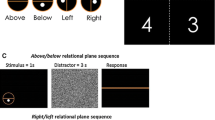Abstract.
The spatial location of an object can be represented in the brain with respect to different classes of reference frames, either relative to or independent of the subject's position. We used functional magnetic resonance imaging to identify regions of the healthy human brain subserving mainly egocentric or allocentric (object-based) coordinates by asking subjects to judge the location of a visual stimulus with respect to either their body or an object. A color-judgement task, matched for stimuli, difficulty, motor and oculomotor responses, was used as a control. We identified a bilateral, though mainly right-hemisphere based, fronto-parietal network involved in egocentric processing. A subset of these regions, including a much less extensive unilateral, right fronto-parietal network, was found to be active during object-based processing. The right-hemisphere lateralization and the partial superposition of the egocentric and the object-based networks is discussed in the light of neuropsychological findings in brain-damaged patients with unilateral spatial neglect and of neurophysiological studies in the monkey.
Similar content being viewed by others
Author information
Authors and Affiliations
Additional information
Electronic Publication
Rights and permissions
About this article
Cite this article
Galati, G., Lobel, E., Vallar, G. et al. The neural basis of egocentric and allocentric coding of space in humans: a functional magnetic resonance study. Exp Brain Res 133, 156–164 (2000). https://doi.org/10.1007/s002210000375
Received:
Accepted:
Issue Date:
DOI: https://doi.org/10.1007/s002210000375




